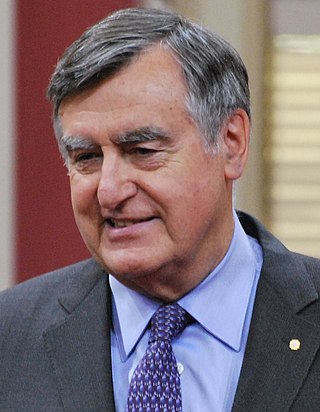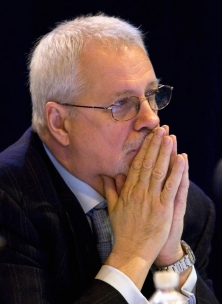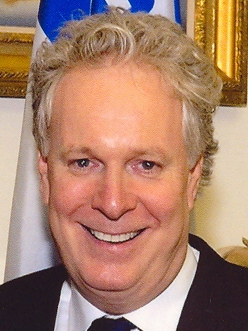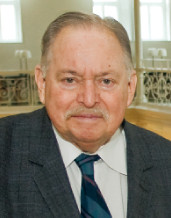The Parti Québécois is a sovereignist and social democratic provincial political party in Quebec, Canada. The PQ advocates national sovereignty for Quebec involving independence of the province of Quebec from Canada and establishing a sovereign state. The PQ has also promoted the possibility of maintaining a loose political and economic sovereignty-association between Quebec and Canada. The party traditionally has support from the labour movement; however, unlike most other social democratic parties, its ties with organized labour are informal. Members and supporters of the PQ are nicknamed péquistes, a French word derived from the pronunciation of the party's initials.

Lucien Bouchard is a French Canadian lawyer, diplomat and retired politician.

The Quebec Liberal Party is a provincial political party in Quebec. It has been independent of the federal Liberal Party of Canada since 1955. The QLP has always been associated with the colour red; each of their main opponents in different eras have been generally associated with the colour blue.

Pierre Marc Johnson is a Canadian lawyer, physician and politician. He was the 24th premier of Quebec from October 3 to December 12, 1985, making him the province's shortest-serving premier, and the first Baby Boomer to hold the office.

The Action démocratique du Québec, commonly referred to as the ADQ, was a right-wing populist and conservative provincial political party in Quebec, Canada. On the sovereignty question, it defined itself as autonomist; it had support from nationalists and federalists. Its members were referred to as adéquistes, a name derived from the French pronunciation of the initials 'ADQ'.

The 1995 Quebec referendum was the second referendum to ask voters in the predominantly French-speaking Canadian province of Quebec whether Quebec should proclaim sovereignty and become an independent country, with the condition precedent of offering a political and economic agreement to Canada.

The 2003 Quebec general election was held on April 14, 2003, to elect members of the National Assembly of Quebec (Canada). The Parti libéral du Québec (PLQ), led by Jean Charest, defeated the incumbent Parti Québécois, led by Premier Bernard Landry, in a landslide.

The 1998 Quebec general election was held on November 30, 1998, to elect members of the National Assembly of the Province of Quebec, Canada. The incumbent Parti Québécois, led by Premier Lucien Bouchard, won re-election, defeating the Quebec Liberal Party, led by Jean Charest. To date this is the last election where the Parti Québécois won a majority of seats in the Quebec Assembly, although not the last in which it formed a government.

The 1994 Quebec general election was held on September 12, 1994, to elect members of the National Assembly of Quebec. The Parti Québécois, led by Jacques Parizeau, defeated the incumbent Quebec Liberal Party, led by Premier Daniel Johnson Jr.
The Black Sheep is a Quebec documentary produced in 1992 by the National Film Board of Canada (NFB). Jacques Godbout directed and starred in the film. Its style belongs to the Quebec cinéma vérité school of filmmaking.
![<i>À Hauteur dhomme</i> 2003 [[Cinema of Canada|Canada]] film](https://upload.wikimedia.org/wikipedia/en/1/1a/%C3%80_Hauteur_d%27homme.jpg)
À Hauteur d'homme is a 2003 Canadian political documentary directed in 2003 by Jean-Claude Labrecque about Bernard Landry and the 2003 general election in Quebec, Canada. It won a Jutra Award for Best Documentary (tie) in 2004. Its style belongs to the Quebec cinéma direct school of filmmaking.

Pauline Marois is a retired Canadian politician, who served as the 30th premier of Quebec from 2012 to 2014. Marois had been a member of the National Assembly in various ridings since 1981 as a member of the Parti Québécois (PQ), serving as party leader from 2007 to 2014. She is the first female premier of Quebec.
Jean Allaire was the author of the Allaire Report, and subsequently in 1994 the first leader of the fiscally conservative, autonomist provincial level political party in Quebec, the Action démocratique du Québec (ADQ). Allaire resigned within a few months for health reasons and was succeeded by Mario Dumont.

The 2007 Quebec general election was held in the Canadian province of Quebec on March 26, 2007 to elect members of the 38th National Assembly of Quebec. The Quebec Liberal Party led by Premier Jean Charest won a plurality of seats, but were reduced to a minority government, Quebec's first in 129 years, since the 1878 general election. The Action démocratique du Québec, in a major breakthrough, became the official opposition. The Parti Québécois was relegated to third-party status for the first time since the 1973 election. The Liberals won their lowest share of the popular vote since Confederation, and the PQ with their 28.35% of the votes cast won their lowest share since 1973 and their second lowest ever. Each of the three major parties won nearly one-third of the popular vote, the closest three-way split in Quebec electoral history until the 2012 election. This was however, the closest three-way race in terms of seat count. Voter turnout among those eligible was 71.23%, a marginal difference from the previous general election in 2003.
Gilles Taillon is the former leader of the Action démocratique du Québec (ADQ). A politician, teacher and businessman in Quebec, Canada; he was the ADQ Member of the National Assembly of Quebec (MNA) for the district of Chauveau in the Quebec City area from the 2007 to the 2008 elections.

Sébastien Proulx is a Canadian politician. He was an Action démocratique du Québec (ADQ) Member of the National Assembly of Quebec (MNA) for the electoral district of Trois-Rivières from 2007 to 2008. He is a lawyer and was the main political consultant to ADQ leader Mario Dumont until his election.

The 2008 Quebec general election was held in the Canadian province of Quebec on December 8, 2008. The Quebec Liberal Party, under incumbent Premier Jean Charest, was re-elected with a majority government, marking the first time since the 1950s that a party or leader was elected to a third consecutive mandate, and the first time for the Liberals since the 1930s, when Louis-Alexandre Taschereau was Premier.

The 2012 Quebec general election took place in the Canadian province of Quebec on September 4, 2012. Lieutenant Governor Pierre Duchesne dissolved the National Assembly on August 1, 2012, following Premier Jean Charest's request. The Parti Québécois were elected to a minority government, with Pauline Marois becoming the first woman to be Premier of Quebec. The Quebec Liberal Party took second place, with Premier Jean Charest losing his seat. The newly formed party Coalition Avenir Québec led by François Legault took third place, while Québec solidaire took 2 seats out of the 125.
The Allaire Report was a report written by the constitutional reform committee of the Liberal Party of Quebec, chaired by lawyer and politician Jean Allaire, recommending a significant transfer of powers from Canada's federal government to the Government of Quebec. Entitled "A Quebec Free to Choose", the report was published on January 29, 1991, and adopted as party policy by the Liberal Party at their 25th convention on March 9, 1991.
The Action démocratique du Québec (ADQ) party fielded eighty candidates in the 1994 Quebec provincial election. One candidate, party leader Mario Dumont, was elected. Information about the party's other candidates may be found on this page.










![<i>À Hauteur dhomme</i> 2003 [[Cinema of Canada|Canada]] film](https://upload.wikimedia.org/wikipedia/en/1/1a/%C3%80_Hauteur_d%27homme.jpg)

